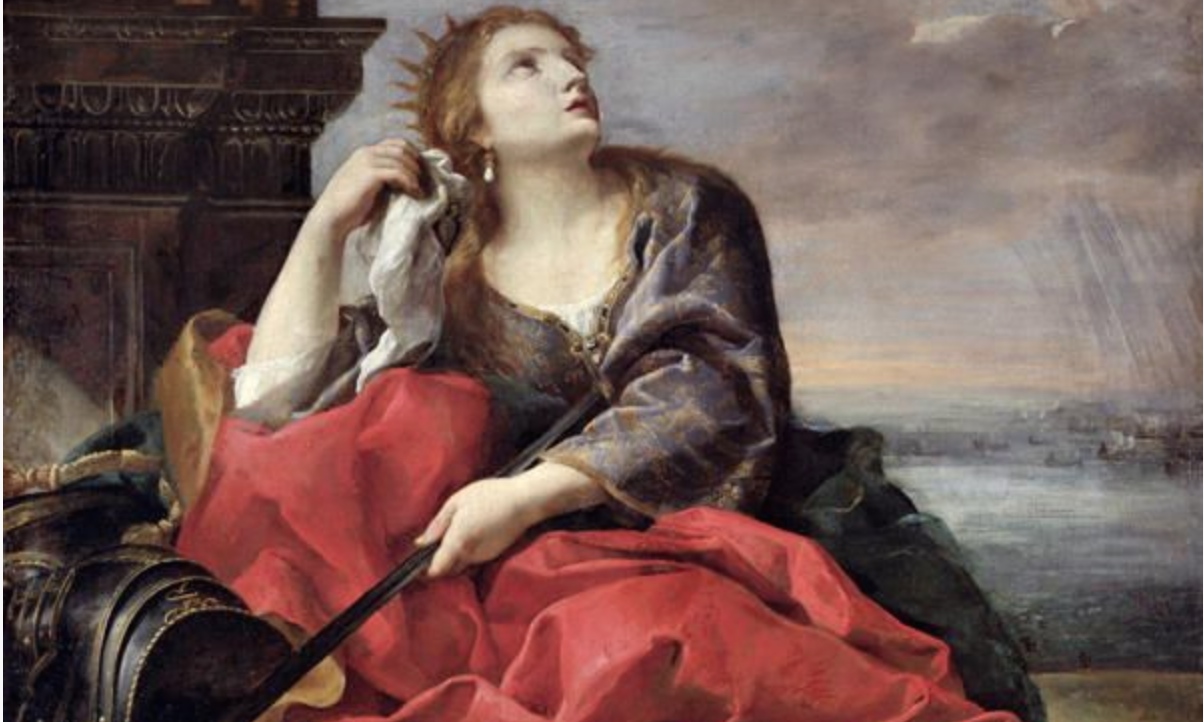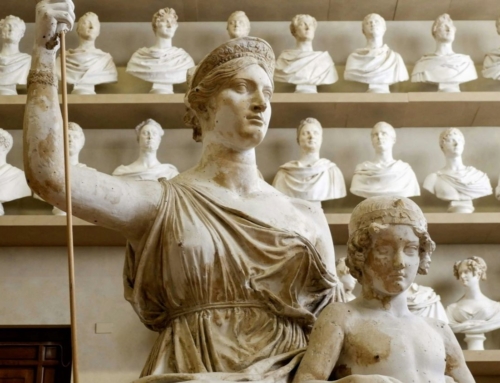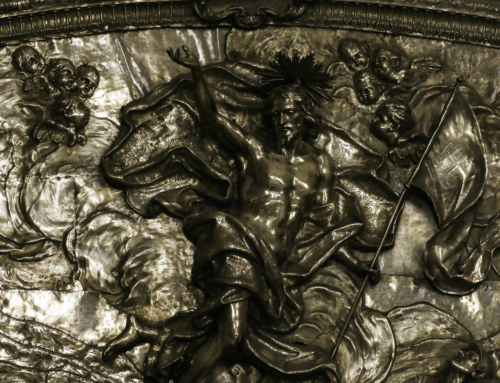When I am laid in earth, may my wrongs create
No trouble in thy breast;
Remember me, but ah! forget my fate.
So laments Dido in the haunting aria that concludes Henry Purcell’s Dido and Aeneas. We the audience know that her wish will not be granted. The African queen’s tale of woe has captured countless hearts over several millennia: Virgil immortalized her fate in his magnum opus, the Aeneid; St. Augustine confessed to having wept during his youth over her plight; Dante pitied her in the Inferno, placing her not with the suicidal in the seventh circle of hell, but with the lustful in the relatively less painful second circle; and Henry Purcell set her grief to music. What is it about her story that so fascinates generation after generation?
Like the best tragic figures, Dido is larger than life, surpassing ordinary men and women in virtue. Her husband murdered by her own greedy brother, she fled the city of Tyre with a ragged band of exiles, braving unpredictable weather and a harsh landscape before outwitting violent tribesmen to found the great city of Carthage, in modern-day Tunisia. Throughout her ordeal, she demonstrates quick wits, chaste devotion to her husband’s memory, and wisdom in governing her city. Moreover, she magnanimously welcomes Aeneas and his weary Trojan refugees to her newly founded city. Although external foes cannot overtake her, Dido is brought low by her own decisions, as her previous virtues are replaced with contrasting vices until she, unable to bear her sudden reversal of fortune, takes her own life.
Alas, due to man’s fallen nature, life contains suffering. Gifted with reason, man alone among bodily creatures is able to ask why there is suffering, why there is evil. In answering this fundamental and universal question of human experience, one considered by every civilization, man is led to ask: Who am I? Where do I come from? Where am I going? Does anything exist after death? These questions draw man out of himself, pointing to the transcendent, telling him there must be more to reality than meets the eye. This search for truth points to the way, the truth, and the light: Jesus Christ crucified. God creates man, gives life meaning, and shows us the answer to suffering in His passion. And yet, as Pope St. John Paul II wrote in his encyclical Fides et Ratio, “People can even run from the truth as soon as they glimpse it because they are afraid of its demands. Yet, for all that they may evade it, the truth still influences life” (§28). Perhaps this is what makes Dido such a sympathetic character: like all people, her life involves suffering – more than most – and because of that sorrow, she, like many of us, struggles to grasp the truth that lies behind that suffering. And, like so many, she fails. She prefers death to a life with shame; we all too often prefer fantasies and distractions to life with imperfections.
How do things get so bad for Dido? Her downfall results from two fateful actions. First, she and Aeneas are consumed with lust for one another, forgetting their responsibilities to their subjects. Eventually, they consummate their desire through an unlawful cohabitation of sorts. Concerning their situation, Virgil writes: “She is moved neither by concern for honor nor for reputation; nor at that time does she think of hiding her affection: she calls it marriage; with this name she covers over her guilt” (Aeneid IV.170-172). In our society, too, some people attempt to cloak their immoral relationships with the name “marriage.” Yet even the pagan Virgil knew that a mere name cannot confer legitimacy.
Dido’s second and greater fault was her pride. When Aeneas remembers his obligation to his followers and leads them from Carthage, the queen is doubly ashamed: she has been spurned by her paramour and has neglected her duty to her own followers. Unable to live with such shame, the fruit of her own folly, she prefers to end her life. For the ancients, the only release from the sorrows of life was death and the sweet oblivion granted by the comforting waters of the river Lethe in Hades. Rather than letting her grief prod her beyond herself to a deeper understanding of reality, Dido hopes to cover her wrongs with a funeral pall. She even deludes herself into thinking that taking her own life will not add to the catalogue of her wrongs, expressing a hope that she will create no trouble in her sister’s breast, as recounted in our opening stanza. Yet any family that has lost a loved one to suicide knows the deep pain the action causes.
In every telling, Dido’s tale begins by showing her great friendship with her sister and ends with the queen killing herself in private, her sister stumbling upon the dying ruler and lamenting over her. In Virgil’s account, Dido’s sister cries out, “What, deserted as I am, shall I bewail first? Dying, have you spurned your sister? … You have killed both yourself and me, sister; your people and your Sidonian ancestors and your city” (Aeneid IV.677-683).
We, as well, live in an all too selfish, palliative society. Botox for the aging, endless entertainment for the stressed, “marriage” for egotistical and unprincipled ends, suicide for the suffering: our first instinct is often to cover over uncomfortable symptoms rather than to confront their causes, to substitute fantasy for reality. In so doing, we harm ourselves doubly, closing ourselves off both to the extirpation of our ills and to the spiritual benefits we may receive in the midst of those ills. Yet as Christians, we worship Jesus Christ, who is the Truth, and are called to accept the demands of truth. In her declaration on religious freedom, the Church teaches:
It is in accordance with their dignity as persons – that is, beings endowed with reason and free will and therefore privileged to bear personal responsibility – that all men should be at once impelled by nature and also bound by a moral obligation to seek the truth, especially religious truth. They are also bound to adhere to the truth, once it is known, and to order their whole lives in accord with the demands of truth. (Dignitatis Humanae 2 §2)
Great sorrow exists in the world. Sometimes the truth can be painful. Sometimes injustice occurs. Sometimes our own actions, our own sins, hurt us far more than anyone else could. Yet, unlike the ancients, we have the gifts of faith, hope, and charity. We know that suffering is not without meaning: that it can lead the soul to God, that it can be united to Christ’s suffering for the salvation of the world, and that it is an opportunity for God’s grace to heal and perfect us. We look to Christ, who came to bear witness to the truth and never wavered, and we hope not for oblivion after death, but the fullness of knowledge that comes from beholding the face of God.
Today the Church celebrates the feast of St. Jude, patron saint of lost causes. Let us pray that, through his intercession, all those who suffer may not flee from the truth but rather embrace it in the person of Jesus Christ, Savior.
✠
Image: Andrea Sacchi, The Death of Dido







